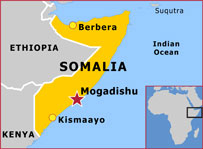JIM.LOBE
WASHINGTON (IPS/GIN) – The population of Somalia has become increasingly radicalized and anti-U.S., according to a new report by a major U.S. human rights group.

U.S. counterterrorism policies and support for the Ethiopian-backed Transitional Federal Government in Somalia have helped to create an increasingly desperate humanitarian and security situation in the East African nation, according to the report by Ken Menkhaus, a Davidson College professor who is regarded as one of the foremost U.S. experts on the Horn of Africa.
The report calls for a thorough reassessment of U.S. policy, questioning U.S. support for the Transitional Federal Government (TFG) and the primacy that Washington has given to its “war on terrorism” in Somalia.
“U.S. counterterrorism policies have not only compromised other international agendas in Somalia, they have (also) generated a high level of anti-Americanism and are contributing to radicalization of the population,” concluded the report, entitled “Somalia: A Country in Peril, a Foreign Policy Nightmare.”
“In what could become a dangerous instance of blowback, defense and intelligence operations intended to make the United States more secure from the threat of terrorism may be increasing the threat of jihadist attacks on American interests,” the report said.
The 17-page report, released by ENOUGH, a group launched last year by the Brussels-based International Crisis Group and the Washington-based Center for American Progress, was released amid continuing violence in Somalia that has forced some one million people to flee their homes since December 2006, when U.S.-backed Ethiopian and TFG forces swept the Islamic Courts Union out of the capital, Mogadishu, and other major cities and towns.
The UN recently estimated that, barring substantial improvement in the security situation, some 3.5 million Somalis will be dependent on humanitarian aid by the end of this year.
“The (current) crisis is fundamentally different and fundamentally worse than the situation of the last decade and a half,” said Chris Albin-Lackey, a Horn of Africa specialist at Human Rights Watch, who appeared with Mr. Menkhaus at the report’s Sept. 3 release during a conference sponsored by the Woodrow Wilson International Center for Scholars.
Mr. Albin-Lackey, who has conducted some 80 interviews of Somali refugees in East Africa in the past month, said ongoing violence, including almost daily artillery bombardments by Ethiopian army and TFG forces on the one hand and opposition militias, including the Islamist Shabaab on the other, as well as assassinations carried out by both sides, have added to the insecurity.
“People have nowhere to turn for security,” he said, adding that search operations by TFG forces, while normally for the purpose of arresting suspected insurgents, had become “an excuse for murder, rape and looting on an incredibly large scale.” As a result, he said, Mogadishu has become “largely depopulated” with about two-thirds of the population–or about 800,000 people–having left their homes there over the past 18 months.
Mr. Menkhaus described last month’s signing of the “Djibouti Agreement” negotiated between moderate leaders of both sides with the help of UN Special Representative Ahmadou Ould-Abdulla last June as an “important step” toward reconciliation but warned that hard-liners in both camps could derail it.
The agreement, which has been rejected by the Shabaab and was only agreed to by the hawkish TFG president, Adullahi Yusuf, under heavy pressure from Ethiopian President Meles Zenawi, calls for a cessation of hostilities, deployment of a U.N. peacekeeping force and the subsequent withdrawal of Ethiopian forces.
“The hope is that any agreement that facilitates the withdrawal of Ethiopian forces will open the door for an end to the insurgency,” according to the report.
But the implementation of the agreement faces “steep challenges,” Mr. Menkhaus warned, not least because “the moderates (who negotiated the accord) don’t control any of the armed groups.” While the Shabaab have already denounced the opposition Alliance for the Reliberation of Somalia leaders as “apostates,” he noted, hard-liners in the TFG know that they can stay in power “if and only if the Ethiopians stay.”
Only by reinforcing the moderates can the international community, including the U.S., enhance the chances for the agreement’s successful implementation and, with it, the chances for reconciliation, according to Menkhaus. But that will require major changes in U.S. and western policies, which have “actually worked to strengthen and embolden hard-liners” over the past two years.
“We’ve gotten the exact opposite of what we set out to achieve,” Mr. Menkhaus noted, including a “population radically angry at us and very fertile ground for Al-Qaeda.”
Related links:
Is America terrorizing Somalia? (FCN, 03-27-2008)
Somalia: a clear case of ‘blood oil’ in Africa (FCN, 01-27-2007)
Annan: U.S. wrong to support warlords in Somalia (FCN, 06-29-2006)
How the U.S. Government destabilized foreign governments (FCN, 07-22-1985)












